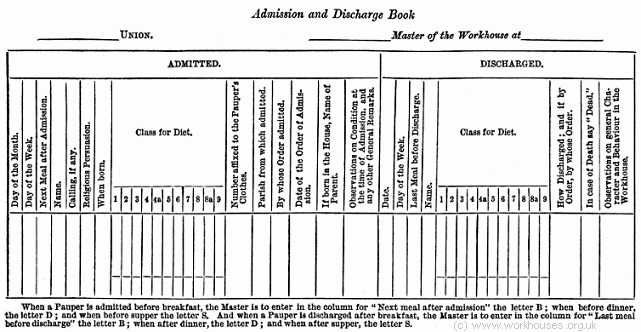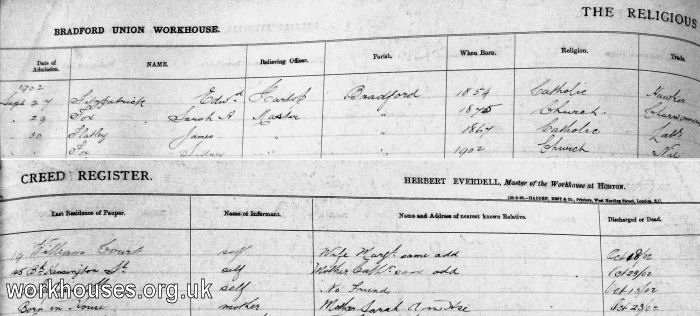Poor Law Union Local Records
After 1834, poor-law administration and workhouse operation centred around the poor-law union, a body administered by its locally elected Board of Guardians. Each union was a collection of parishes, typically twenty or thirty, often centred around a market town or other centre of population. All of the poor law unions are listed, county by county, under the Workhouse Locations section of the menu at the left of the screen.
A basic requirement for researching post-1834 workhouse records is therefore identifying which union you are interested in. If you don't know what union a particular parish or place belongs to, you can try entering its name of this site's "Search" box.
Records concerning the day-to-day administration of a union and its workhouse are usually found in local record offices — most commonly the county record office in which the union was located. Where a union straddled county borders, or where boundaries have changed over the years, records may occasionally have ended up in more than one record office.
Records to be found in local archives include:
- Board of Guardians minute books
- Ledgers and Accounts
- Master's journal
- Chaplain's books
- Orders of removal
- Orders for medical relief
- Orders for maintenance under the 1845 Bastardy Act
- Registers of various sorts, including:
- Admissions and discharges
- Porter's book
- Indoor pauper lists
- Births, baptisms, deaths, burials
- Creed register (religious affiliation)
- Punishment book
- Leave of absence
- Bathing register
- Inmates' own clothing register
- Children under control of the Guardians
- Children boarded out
- Lunatic register
- Register of mechanical restraint
- Out-relief payments
- etc. etc.

Specimen admission and Discharge register.
For family historians, religious creed registers, introduced in 1869, can be particularly useful. As well as religious affiliation and admission and discharge details, they often contain other useful information. The example below, from Bradford workhouse in 1902, spreads across two pages and includes columns for each person's last address and the name and address of their nearest known relative.

Creed register.
Although not linked to poor relief, Vaccination registers may also be of interest. In 1840, poor-law unions were made responsible for administering the new scheme for free vaccinations, aimed primarily at children. These were originally voluntary but became became compulsory from 1853. As well as vaccination information, these registers include details of each child's date of birth, parents, address etc.
It should be emphasized that the records which survive for different unions vary enormously — in some case, extremely little remains. An indication of the existing records and their location is given at the end of each union's individual web page elsewhere on this site.
- County and metropolitan record offices that hold poor-law records are listed on a separate page on this site.
- Many Poor Law records are included in the National Register of Archives — try doing a "Corporate Search" and entering a search term such as "poor".
- The locations of archives can be found available in the Find-an-Archive directory of UK Archives. The facility lets you browse an alphabetical list, and also search its database.
- For London unions and parishes, The London Archives is the best starting place. The LA produce a useful Guide to Poor Law Records From 1834 Onwards. Other archives in the London area may be located via the AIM25 (Archives Inside the M25) web site.
- For Scotland, the Scottish Archives Network is a good starting point for locating poorhouse records, while general births/marriages/deaths and census records can be accessed via Scotland's People.
- In Ireland, poor law records are held in a variety of archives including the Public Record Office of Northern Ireland, the National Archives of Ireland, and a number of County Libraries.
If you can't visit the appropriate record office, they may be able to carry out research on your behalf but will normally charge for this.
The Poor Law Union Records guides by Jeremy Gibson and others provide a very comprehensive (though increasingly dated) directory of surviving poor-law records in England and Wales.
Transcriptions of local workhouse records have been published as microform, print or CD by a number of family history societies and companies such as the Eureka Partnership. Many of these are available via the FFHS Genfair online store.
A growing number of workhouse records are now available online. These include:
- Ancestry:
Bedfordshire
, Cornwall
, Dorset
, Glamorgan
, Kensington & Chelsea
, London , Medway
, Norfolk
, Swansea Area Unions
, Warwickshire
, Westminster and West Yorkshire
.
- FindMyPast: Bury, Cheshire, Chesterfield, Chorlton, Clare, Donegal, Dublin, Ecclesall Bierlow, Farnham, Godstone, Guildford, Kent, Lincolnshire, Linlithgowshire, Liverpool, London, Manchester, Monmouth, Monmouthshire, Norfolk, Oldham, Portsmouth, Richmond, Sligo, Southwark, Westminster and Withington.
- Family Search (free but browsable images only) — Kent & Norfolk
Unless otherwise indicated, this page () is copyright Peter Higginbotham. Contents may not be reproduced without permission.



